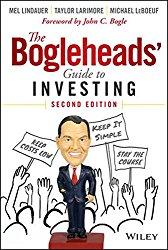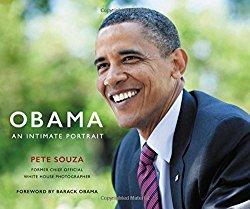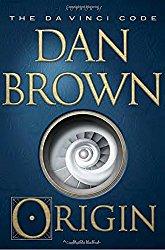The Bogleheads’ Guide to Investing is truly a great book and one that you should read if you want to get involved in investing and to improve your financial life in general. It includes information on mutual fund investing, budgeting, and what kinds of insurance you should have. It also includes a lot of good information on research that has been done showing things like that the average investor would be better off just buying index mutual funds than managed mutual funds since most index funds outperform managed funds over time. Likewise, it favors investors using mutual funds instead of individual stocks for the same reason – on average, most investors do better just buying index mutual funds than they do buying individual stocks. Now I have always been an individual stock (and bond, and warrant, and convertible) investor, probably because my father was an individual stock investor. Of course, I started before index funds really existed. Mr. Bogle started Vanguard and introduced the world to index funds back in 1976 with the start of the Vanguard S&P 500 Index fund, but back in 1984 when I started investing the fund was relatively small and there was little talk of index mutual funds, so I hadn’t heard of it. I did buy a few closed-end mutual funds during that period, such as Tri-Continental Corp and Adam’s Express, but I was mainly invested in several individual stocks, taking up positions of 100 shares at a time.
Now I have always been an individual stock (and bond, and warrant, and convertible) investor, probably because my father was an individual stock investor. Of course, I started before index funds really existed. Mr. Bogle started Vanguard and introduced the world to index funds back in 1976 with the start of the Vanguard S&P 500 Index fund, but back in 1984 when I started investing the fund was relatively small and there was little talk of index mutual funds, so I hadn’t heard of it. I did buy a few closed-end mutual funds during that period, such as Tri-Continental Corp and Adam’s Express, but I was mainly invested in several individual stocks, taking up positions of 100 shares at a time.
There are really two purposes to a mutual funds. The first is to allow small investors to spread their money out over several stocks, and thereby eliminate the risk that they would be substantially hurt should one of the companies in which they invest have an issue, for example, if the CEO defrauds the company or a company grossly misreads the markets and ends up closing down a lot of stores and going bankrupt. I’ve had both things happen since I’ve been investing and I can affirm that you effectively lose your whole position when they do occur. If you had your whole retirement savings in thee companies and one of them has an issue like this, you would see 1/3rd of your money disappear in a day. If you have only a few stocks and even if nothing big happens, but a company stock simply flounders around for ten years and goes nowhere, you still have missed ten years of potential appreciation on your money. You should have seen your money at least double in that time period, meaning you would have half as much money at retirement as you could have had. This is why individual investors need diversification.





Find the Top 100 Books 40-60% off
The second reason for investing in mutual funds is to have an expert investor manage your money for you. You pay an expert to do the research and pick the stocks for you, decide when to invest, and keep tabs on things. You have fund companies like Janus who claim to have all sorts of insight and access to information that will allow them to make the best picks and do far better than you could do investing alone with your limited resources, or so the sales brochure says.
The trouble with this second idea is that professional money managers with managed mutual funds do not outperform the markets on a regular basis. Various studies have shown both that investors would do better using index funds or simply throwing darts at a dart board much of the time. This is because managers don’t outperform the markets with their picks or their market timing, instead maybe matching the performance of the markets at best. You then do worse than the markets in a managed mutual fund due to the trading and research costs, especially if you include the fees they charge each year whether they beat the markets and make you money or not.



Pet Supplies for Your Furry Friend
So going back to the first question, why would anyone buy individual stocks instead of just buying index mutual funds? If the pros can’t beat the index funds, what chance would an individual investor have? The thing is, while there are few if any managed mutual funds that beat the index funds, there are individual investor who do so, and there are enough of them to make it more than just a fluke. In fact, Warren Buffett, who has been the richest man in America at various times in the past, made his fortune by picking individual stocks.
The secret lies in the way you buy individual stocks, taking advantage of something an individual can do and a professional money manager at a mutual fund cannot – concentrate your holdings in a few great stocks and hold for long periods of time.
Concentrate your holdings.
By concentrating your holdings, while subjecting yourself to the single-stock risk discussed earlier, you are giving yourself the opportunity to make a real significant gain when you are right. Professional money managers can’t do this because they have so much money to invest. If they tried to put all of their money in just a handful of stocks, they would end up driving the price up and owning the companies. An individual can buy 500, 1000 or even 2000 shares without the market even noticing.
If you own a large position and the CEO does jump town for Rio and the company goes bankrupt, you might be out $10,000 or $20,000 by doing this, but if you have a company that doubles a few times over a ten-year period, you can make $50,000 or even $100,000 if you have a lot of shares. One success makes up for a couple of failures.



Find the Hottest Toys and Games
Hold for a long period of time
A professional money manager is constantly having her performance compared with the markets and other money managers. Some managers even go out and buy whatever stocks did well right before the quarterly or annual report comes do to make it look like they had all of the hot stocks during the period. This adds to cost and means that they are buying stocks when they have already gone up in price.
Individuals can buy shares in a company and then just wait for the company to grow and do well, eventually catching the eye of the markets. I sat on Home Depot stock through the late 1990’s and early 2000’s while the stock went nowhere. Eventually they traded out CEOs and started to grow again. Over the last few years, they have gone from $18 per share to about $190, which means that over the 20-year period they have returned about 12% annualized, compared with an 8% return for the S&P 500. If you were to look at my performance on that stock back in 2009, you would have only seen the stock go from about $18 to $20 over the 12-year period and I would have probably been fired if I were a fund manager. It is only in the last ten years that the stock has greatly outperformed the markets.
So the bottom line is that individuals would be just fine buying only index mutual funds and the vast majority of investors should do so. You’ll outperform managed funds and earn a good return on your money. Every investor should have index mutual funds as the core holdings in their 401k plans, IRAs, educational IRAs, and other places where they really need to make sure the money will grow over time and be there when they need it. Some investor, however, could also be well-served to add a couple of individual stocks, bought in high concentrations (at least 500 shares but never consisting of more money than one would be willing to lose) and held for long periods of time to their investment accounts outside of their core mutual-fund holdings. I think there is still a role there for individual stocks.
New to investing? Want to learn how to use investing to supercharge your road to financial freedom? Get the book: SmallIvy Book of Investing: Book1: Investing to Grow Wealthy
Have a question? Please leave it in a comment. Follow me on Twitter to get news about new articles and find out what I’m investing in. @SmallIvy_SI
Disclaimer: This blog is not meant to give financial planning or tax advice. It gives general information on investment strategy, picking stocks, and generally managing money to build wealth. It is not a solicitation to buy or sell stocks or any security. Financial planning advice should be sought from a certified financial planner, which the author is not. Tax advice should be sought from a CPA. All investments involve risk and the reader as urged to consider risks carefully and seek the advice of experts if needed before investing.
